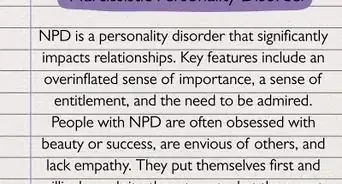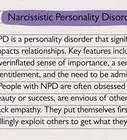This article was co-authored by Jay Reid, LPCC. Jay Reid is a Licensed Professional Clinical Counselor (LPCC) in private practice in San Francisco, CA. He specializes in helping clients who have survived a narcissistic parent or partner. Treatment focuses upon helping clients identify and challenge self-diminishing beliefs as a result of narcissistic abuse. Jay holds a BA in Psychology from the University of Pennsylvania and an MS in Clinical Psychology from Penn State University.
There are 7 references cited in this article, which can be found at the bottom of the page.
This article has been viewed 58,143 times.
Being around a narcissist can be both intoxicating and frustrating. This person has a cocky, no-holds-barred attitude that attracts you to them. At the same time, their infatuation with themself leaves little or no room for you— unless it directly benefits them, of course. It's totally understandable if your relationship with this person makes you really confused. If you want to keep the narcissist in your life around, you will need some coping tricks up your sleeve. Set firm boundaries, learn how to navigate the landmines of communication and take good care of yourself to manage life with a narcissist.
Steps
Setting Boundaries
-
1Identify your boundaries. If you want to live with them, you can't realistically micromanage everything the narcissist does or says. You also can't just let them treat you however they please. So, where's your middle ground? Figure out what narcissistic behavior you can't tolerate.[1]
- For example, you may be able to tolerate them dominating conversations, but you are not able to accept when they insult you.
- Narcissists are infamous for walking over people and abusing their goodwill, so you need to know your limits.
-
2Make a list of the things your narcissist does that cross the line. Once you've identified your boundaries, make a list of the situations in which the narcissist tends to violate them. By writing this out, you will know which contexts you need to be wary of.[2]
- For instance, the narcissist may be more likely to manipulate you in front of a group.
- Noticing this pattern can help you learn which scenarios to be on guard against. It also helps you figure out how to phrase your boundaries.
Advertisement -
3Voice your boundaries with confidence. Now that you know what you can not tolerate, communicate those boundaries when the offensive behavior happens. You might say, “I can see that you're angry, but I will not tolerate insults. If you continue to insult me, I will leave.”[3]
- State your boundaries with confidence, lifting your chin, making eye contact, and keeping your voice strong and steady. That way, the narcissist knows you're serious.
-
4Enforce consequences as needed. Narcissists will cross every line you make, so it's important that you actually follow through with consequences. If you've said you'll end the conversation, disengage. If you've threatened to leave, do so.[4]
- Setting consequences doesn't have to be the end of the relationship, you can tell the narcissist “I'll be happy to continue talking when you are able to communicate without insults.”
- Keep in mind that enforcing consequences may not cause the narcissist to change their behavior.
-
5Expect pushback, but stand firm. More than likely, the narcissist will still test your boundaries, no matter how strongly you set them. Stand firm despite any pushback.[5]
- For example, the narcissist may insult you anyway just to see if you will actually do anything about it. If this happens, you must enforce the consequences to show them you mean what you say.
- If you waiver on setting boundaries, the narcissist won't respect you.
-
6Know how to identify a narcissist. True narcissists think highly of themselves, but they are also entitled. They believe they deserve attention and admiration and may not care who they hurt to get it. They cannot tolerate criticism, but may regularly belittle or demean others to make themselves look better,[6]
- Being a little self-obsessed or high in confidence is common, but these traits are different from full-blown narcissism.
- Pay attention to who they spend their time with. Narcissists tend to be in relationships with people who won't speak up and stand up for themselves.
Having Pleasant Interactions
-
1Don't expect an apology. The bottom line about the narcissist is they care only about themselves. No offense, but they're not really concerned about you. If they’ve offended you, nurse your wounds elsewhere— they won’t be apologizing.[7]
- For example, if the narcissist in your life lied to you about something, they probably won't own up to the behavior. They are more likely to recall saying things differently or blame you in some way.
- You'll save yourself trouble by not expecting the narcissist to accept blame for any wrongdoing.
-
2Dust off your negotiation skills. The narcissist doesn't have to always get their way. Identify where your power lies with the narcissist and use it in negotiations.[8]
- For example, if your narcissistic brother wants money in exchange for yard work, be sure the work gets done in advance before the cash changes hands. Otherwise, the narcissist is unlikely to follow through with their end of the bargain.
-
3Make what you want seem like what they want. Narcissists concentrate almost entirely on advancing themselves. So, if you want the narcissist to do something for you, it's best to frame it in terms of what's in it for them.[9]
- For instance, say, “Hey, Sally, it'd be great if you could help out with the charity dinner. I know volunteer hours will look good on your resume.”
-
4Use “we" language. Get on the same team with the narcissist in your life by changing the way you speak. Rather than saying “you” or “me,” say “we" to bring about a feeling of cooperation.[10]
- For example, instead of "I need to figure out a solution," say "We need to figure out a solution, Dave."
- Making this small change to your language will improve interactions with the narcissist by making it seem like you are on the same side.
-
5See bad behavior as being about them, not you. At the core of the narcissistic personality is a deep need to feel worthy. Recognize that when your narcissistic loved one acts out, it's not about you. These behaviors are driven by their innate insecurities. Try not to take them personally.[11]
- For example, if your narcissistic partner cheats, it doesn't mean you did anything wrong. They likely saw an opportunity and took it without considering the consequences. It wasn't done specifically to hurt you.
- If you must, try repeating something to yourself like, “Narcissism is about them, not me.”
Caring for Yourself
-
1Confide in empathetic people who can offer their support. Being around a narcissist can really drain you of energy, so be sure to spend time with positive people who are able to pour love and attention back into you. Spend time with people who have empathy and are able to focus on you and your needs.[12]
- When you need someone to talk to, reach out to loved ones and share what's going on. Talk to people who are willing to listen to your side of things and give support as needed.
- Try to carve out time for supportive people weekly, so that you can get the attention and nurturing that the narcissist does not give.
-
2Acknowledge your best traits when you need a self-esteem boost. The narcissist’s extreme self-esteem can be a blow to your own confidence. Counter any dips to your self-esteem by identifying your strengths.[13]
- Make a list of all your best character traits. Read the list aloud whenever you need an extra lift to your confidence.
- Make your list even more empowering by reading each trait after saying, “I am.” For example, you might say, “I am kind" or “I am a great listener.”
-
3Set aside time for self-care to manage stress. Life with a narcissist often means pouring time, affection, and resources into them nearly 24/7. However, to continue the relationship, you'll have to pour some back into you. Build a self-care routine that helps refill your cup.[14]
- Visit the spa or try self-massage. Go to lunch with friends. Journal your feelings, listen to music, or take a warm bath.
-
4Talk to a counselor or join a support group. If you need extra support to live with a narcissist, consider talking to others who understand your experience. Attend a local support group for people with loved ones with narcissistic personality or consult with a therapist who has experience with narcissism.[15]
- Contact a local mental health clinic to find support groups or counselors in your community.
- Work with your counselor and support group and ask yourself if it's worth living with the person or whether you may need to leave them.
Conversation Help
Expert Q&A
Did you know you can get expert answers for this article?
Unlock expert answers by supporting wikiHow
-
QuestionWhat are some ways to identify a narcissist in a relationship?
 Jay Reid, LPCCJay Reid is a Licensed Professional Clinical Counselor (LPCC) in private practice in San Francisco, CA. He specializes in helping clients who have survived a narcissistic parent or partner. Treatment focuses upon helping clients identify and challenge self-diminishing beliefs as a result of narcissistic abuse. Jay holds a BA in Psychology from the University of Pennsylvania and an MS in Clinical Psychology from Penn State University.
Jay Reid, LPCCJay Reid is a Licensed Professional Clinical Counselor (LPCC) in private practice in San Francisco, CA. He specializes in helping clients who have survived a narcissistic parent or partner. Treatment focuses upon helping clients identify and challenge self-diminishing beliefs as a result of narcissistic abuse. Jay holds a BA in Psychology from the University of Pennsylvania and an MS in Clinical Psychology from Penn State University.
Licensed Professional Clinical Counselor Some of the insidiousness of narcissism as a disorder is that it has so many different permutations. It really comes down to one person’s own experience in the relationship. With that being said, people have written a lot about the cycle of narcissistic abuse in relationships. In this cycle, there's usually a very intense initial stage of idealization where the non-narcissistic partner feels incredibly adulated and adored, like the narcissist might be their soulmate. Then, once that bond has been established, the narcissist may gradually start to become more critical of the other person. Eventually the partner will find they're not important to the narcissist anymore in the way that they were at the beginning of the relationship. Eventually the narcissist can become more direct with their criticisms. They may commit outward acts of disrespect, question the intelligence of their partner, immediately dismiss their opinion or point of view, mock or humiliate them in the presence of mixed company, and so on. Finally, there's the discard phase, where the narcissist may break up with their partner and leave the relationship.
Some of the insidiousness of narcissism as a disorder is that it has so many different permutations. It really comes down to one person’s own experience in the relationship. With that being said, people have written a lot about the cycle of narcissistic abuse in relationships. In this cycle, there's usually a very intense initial stage of idealization where the non-narcissistic partner feels incredibly adulated and adored, like the narcissist might be their soulmate. Then, once that bond has been established, the narcissist may gradually start to become more critical of the other person. Eventually the partner will find they're not important to the narcissist anymore in the way that they were at the beginning of the relationship. Eventually the narcissist can become more direct with their criticisms. They may commit outward acts of disrespect, question the intelligence of their partner, immediately dismiss their opinion or point of view, mock or humiliate them in the presence of mixed company, and so on. Finally, there's the discard phase, where the narcissist may break up with their partner and leave the relationship. -
QuestionWhat is a narcissistic husband?
 Klare Heston, LCSWKlare Heston is a Licensed Independent Clinical Social Worker based in Cleveland, Ohio. With experience in academic counseling and clinical supervision, Klare received her Master of Social Work from the Virginia Commonwealth University in 1983. She also holds a 2-Year Post-Graduate Certificate from the Gestalt Institute of Cleveland, as well as certification in Family Therapy, Supervision, Mediation, and Trauma Recovery and Treatment (EMDR).
Klare Heston, LCSWKlare Heston is a Licensed Independent Clinical Social Worker based in Cleveland, Ohio. With experience in academic counseling and clinical supervision, Klare received her Master of Social Work from the Virginia Commonwealth University in 1983. She also holds a 2-Year Post-Graduate Certificate from the Gestalt Institute of Cleveland, as well as certification in Family Therapy, Supervision, Mediation, and Trauma Recovery and Treatment (EMDR).
Licensed Social Worker
-
QuestionCan a person change from being a narcissist?
 Klare Heston, LCSWKlare Heston is a Licensed Independent Clinical Social Worker based in Cleveland, Ohio. With experience in academic counseling and clinical supervision, Klare received her Master of Social Work from the Virginia Commonwealth University in 1983. She also holds a 2-Year Post-Graduate Certificate from the Gestalt Institute of Cleveland, as well as certification in Family Therapy, Supervision, Mediation, and Trauma Recovery and Treatment (EMDR).
Klare Heston, LCSWKlare Heston is a Licensed Independent Clinical Social Worker based in Cleveland, Ohio. With experience in academic counseling and clinical supervision, Klare received her Master of Social Work from the Virginia Commonwealth University in 1983. She also holds a 2-Year Post-Graduate Certificate from the Gestalt Institute of Cleveland, as well as certification in Family Therapy, Supervision, Mediation, and Trauma Recovery and Treatment (EMDR).
Licensed Social Worker
References
- ↑ https://psychcentral.com/blog/archives/2012/12/27/how-to-live-with-a-narcissist/
- ↑ https://psychcentral.com/blog/archives/2012/12/27/how-to-live-with-a-narcissist/
- ↑ https://blogs.psychcentral.com/narcissism-decoded/2017/06/11-ways-to-set-boundaries-with-narcissists/
- ↑ https://blogs.psychcentral.com/narcissism-decoded/2017/06/11-ways-to-set-boundaries-with-narcissists/
- ↑ https://www.psychologytoday.com/blog/fulfillment-any-age/201408/8-ways-handle-narcissist
- ↑ https://www.helpguide.org/articles/mental-disorders/narcissistic-personality-disorder.htm
- ↑ https://www.psychologytoday.com/blog/understanding-narcissism/201710/the-survival-guide-living-narcissist
- ↑ https://psychcentral.com/blog/archives/2012/12/27/how-to-live-with-a-narcissist/
- ↑ https://www.psychologytoday.com/blog/fulfillment-any-age/201408/8-ways-handle-narcissist
- ↑ https://www.psychologytoday.com/blog/understanding-narcissism/201710/the-survival-guide-living-narcissist
- ↑ https://www.psychologytoday.com/blog/understanding-narcissism/201710/the-survival-guide-living-narcissist
- ↑ https://www.helpguide.org/articles/mental-disorders/narcissistic-personality-disorder.htm
- ↑ https://www.psychologytoday.com/blog/the-legacy-distorted-love/201412/is-your-partner-narcissist-here-are-50-ways-tell
- ↑ https://www.professional-counselling.com/how-to-deal-with-a-narcissistic-partner.html
- ↑ https://www.professional-counselling.com/how-to-deal-with-a-narcissistic-partner.html
About This Article
If you have a narcissist in your life, learn to set firm boundaries and try to make your interactions with them as pleasant as possible. To set boundaries, clearly tell them when they've crossed the line by saying something like “I can see that you’re angry, but I won’t tolerate insults. If you keep insulting me, I’ll leave.” When interacting with a narcissist, frame things in ways that compliment them. For instance, if you want them to help you, try saying “It would be great if you could serve food at the charity dinner. I know volunteering will look good on your resume.” To learn how to not take a narcissist’s behavior personally, keep reading!
















































































